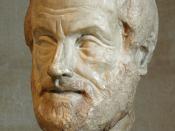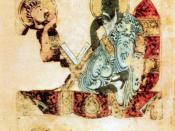At the beginning of the seventh century Byzantium, the Eastern Empire now completely separate from the disintegrated west, was the most powerful force in the world rivaled by Persia under the Sassanian dynasty. But in a small settlement in south Arabia a man was born who was to change the history of the east forever. In the last chapter I touched briefly on the differences between "inner-directed' and "outer-directed cultures." In an inner directed culture all of the activities allowed by the culture are determined by the members of the culture as they faced its emerging needs. For example, Periclean Athens where all activities were determined by the glory of the state and of the citizens who made up the Democracy. In the harsh environment of the Arabian desert life was determined in response to powers of nature which were seen as divine entities. It is necessarily outer-directed. Life in such an outer-directed culture is simpler.
Cultural norms and activities are determined and enforced by the outer agency. In this case the desert. A culture which can come to grips with life in an outer-directed sense can achieve a degree of closeness that is not possible in an inner-directed culture because restrictions on activities are never arbitrary. And their authority is the world itself as represented by undeniable divine entities. The inhabitants of Mecca were Bedouin tribesmen with a long history of nomadic life in the Arabian steppes. They came from a life lived by a strict code developed in response to the harsh environment of the desert. Life in Mecca, on the other hand, was completely different It was developed around its value as an oasis that lay on the crossroads of a number of highly successful trading routes. Success in Mecca was secular. Life was arbitrary. It was...


